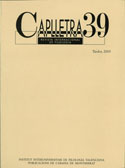«Mala domna» i «Dona de mal»: el rebuig de l'estimada infidel per part dels trobadors i dels poetes catalans de l'edat mitjana
DOI:
https://doi.org/10.7203/caplletra.39.4856Palabras clave:
medieval Occitan literature, medieval Catalan literature, mala cansó, maldit, medieval literary misogyny Resumen
Resumen
The Occitan «mala cansó» of the twelfth and thirteenth centuries and the Catalan «maldit» of the fourteenth and fifteenth centuries both display a singular aspect of medieval literary misogyny. In both cases criticism is not levelled against women in general, but against a particular lady who has been previously loved by the poet and is now rejected. The poet blames her directly and harshly because, after leaving him, she has given herself to a man from an inferior social background. As a result, the poet bids farewell to her and moves away. Some of the Catalan poets of the Middle Ages persisted in this literary outlet. They borrowed for their own «maldits» the motifs and
expressions that were characteristic of the break-up and the violent farewell, and adapted them to their own language and to the bourgeois environment of the towns.
 Descargas
Descargas
Descargas
Publicado
Cómo citar
-
Resumen651
-
PDF (Català)164
Número
Sección
Licencia
El autor o autora que dirija un trabajo a la redacción de Caplletra para ser publicado tiene que ser la persona titular legítima de los derechos de explotación. La legitimación para la publicación del trabajo tiene que incluir también las imágenes, las tablas, los gráficos y otros materiales que puedan complementar el texto, con independencia de si es su autor o autora.
Copyright. Al publicar el trabajo en la revista, el autor o autora cede a Caplletra. Revista Internacional de Filologia los derechos de explotación (reproducción, distribución y comunicación pública), tanto para la edición impresa en papel como para la versión electrónica.
Todos los trabajos publicados en Caplletra se encuentran bajo una licencia Creative Commons del tipo Reconocimiento-NoComercial-SinObraDerivada 4.0.
RESPONSABILIDAD
Caplletra. Revista Internacional de Filologia no se identifica necesariamente con los puntos de vista sostenidos en los trabajos que publica.Caplletra. Revista Internacional de Filologia declina toda responsabilidad derivada de cualquier vulneración eventual de los derechos de propiedad intelectual que pudiera ser llevada a cabo por los autores o autoras.






